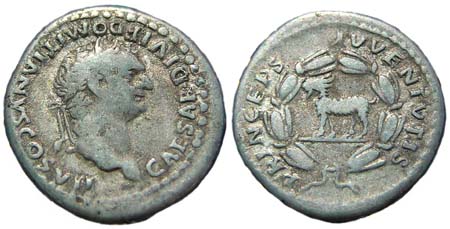THE TWELVE CAESARS
ACTA ACCLA, September 2005
Domitian
Lived 51 - 96 CE
Emperor 81 - 96 CE
Text by Mark Westerline
Titus Flavius Caesar Domitianus Augustus (usually known by most as Domitian) was born in Rome on October 24th in 51 CE during the reign of the emperor Claudius. At the time of his birth, his father Titus Flavius Vespasianus (Vespasian) was a politician and military commander. In his biography of the Caesars, Suetonius describes him as a learned and educated adolescent, with elegant conversation. While Domitian had privileges beyond most Romans in his upbringing as a young man, he was often isolated from other members of his family. His brother Titus was ten to twelve years older than him, and he was the one that often accompanied his father on military campaigns while Domitian remained in Rome. His mother Flavia Domitilla also died before Vespasian became emperor. Domitian had exposure to the intrigue and chaos that accompanied changes of power at this time in the Roman Empire. In 69 CE, Domitian’s father Vespasian made a power play to become emperor, when his legions began to move on Rome to battle the legions of Vitellius. Domitian was living in Rome at the time and in serious danger as soldiers loyal to Vitellius laid siege to the temple of Capitoline Jupiter where Domitian and his uncle (Titus Flavius Sabinus II usually known as Sabinus) attempted to fortify themselves. Domitian was able to escape, but his uncle Sabinus was not as lucky and he was captured and executed.
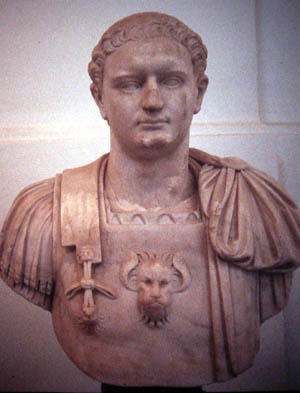
Emperor Domitian
Upon Vespasian becoming emperor, Domitian's role in the 70's was determined largely by Vespasian's choice of Titus as his successor. To him fell a series of ordinary consulships, the tribunician power, and the censorship. He was given responsibility, but no real power. In 70 CE, Domitian married Domitia Longina, daughter of the highly regarded general, Gnaeus Domitius Corbulo. Like many imperial marriages, this was believed to be a troubled one. The union produced two children that both died at a young age. Domitian was said to engage in numerous affairs, including an incestuous one with his niece Julia Titi. Domitian divorced and exiled his wife Domitia in 83 CE. Later after Julia Titi's death, Domitia would be recalled to the palace, where she lived with Domitian. Domitia would later exact her revenge on Domitian.
When Vespasian died in 79, Titus succeeded him as emperor without any opposition. Titus ruled well for a little over two years and had to deal with several catastrophes including the eruption at Vesuvius and another major fire in Rome. Most modern historians believe Titus died of fever in 81 and that Domitian did not cause the death of Titus.
Upon being informed of his brother’s death, Domitian acted quickly to assure his position as new emperor. He was said to have secretly met with the Praetorian guards to hail him as new emperor. Domitian was confirmed as emperor by the Roman senate on September 14, 81 CE. One of his first acts was to have Titus consecrated. Within the past twenty years, Rome had experienced two great fires and a civil war that Rome was still trying to recover from. Domitian responded by erecting, restoring, or completing some 50 structures. This building program was on a grand scale and beyond most other imperial reigns. In order to facilitate this recovery, the provinces were taxed more heavily, so one would imagine Domitian was not a popular guy in these regions. Remember, that Domitian’s father Vespasian started out as a tax collector. While Domitian did raise taxes in most parts of the Roman Empire, he also did take aggressive steps to eliminate corruption and mismanagement.
Rome was not seriously threatened by its enemies during Domitian’s reign, but he had to deal with Germanic, Dacian and Sarmatian tribes along the Rhine and Danube. He was the first emperor since Claudius to campaign in person. Most historians seem to agree that Domitian never proved himself to be much of a military man, but like most areas of his administration he was personally involved. His detractors would call him a micromanager. In 88-89 CE, there was a revolt in upper Germany led by then governor Lucius Saturninus. Domitian had the revolt quickly crushed by using the legions of lower Germany led by Lappius Maximus.
Domitian considered himself the guardian of the people’s morals, and in 85 CE he appointed himself censor for life, with a general supervision of conduct and morals. Although Domitian’s conduct did not always reflect good personal conduct and moral behavior, he was a big supporter of traditional Roman religion; he also seemed to hold Minerva and Jupiter in the highest esteem. His earlier safe escape from the temple of Capitoline Jupiter may have accounted for his allegiance to that god.
The latter part of Domitian’s rule was also considered the low point. The emperor had taken almost all power away from the Roman senate and the emperor became increasingly paranoid of plots and plans to remove him. Domitian frequently used spies and informants against the Roman nobility, and would not hesitate to execute anyone he believed was plotting against him, real or imagined.
In 96 CE, a real plot against Domitian finally did succeed. It was thought to involve many, including members of the Praetorian Guard, household staff, his wife Domitia and members of Roman nobility. Domitian was attacked while in his bedroom by a knife wielding servant named Stephanus. Stephanus either killed Domitian by himself or others from within the household appeared and finished off Domitian. Domitian died at age forty-four and with him died the Flavian dynasty. He was the last of Suetonius' famed "Twelve Caesars". There was actually a happy ending with the parting of Domitian. The senate was in power again and they elected the elderly senator Nerva as the new emperor. Nerva introduced a new system of succession known as the adoptive emperors which helped bring stability back to the Roman Empire with a period to follow Nerva known as the five good emperors. This would be the peak of the Roman Empire.
Coinage
Domitian was emperor for fifteen years, a length of imperial power only exceeded since Augustus by Tiberius who ruled for an impressive twenty-seven years. If you also include the whole period of the Flavian dynasty when Domitian was pictured on coinage, you have a period of 69-96 CE (a period of also twenty-seven years). Needless to say, examples of his coinage are both numerous and diverse. The scale of his local coinage is considered to be found in similar numbers as that of Nero who reigned for fourteen years. The goddess Minerva or other items related to her are frequently found on Domitian's coinage. Domitian's local coinage also has some interesting reverses related to the Secular games of 88 CE. Also among the local coinage, Domitian's reign was thought to be the first to introduce the anonymous quadrans which endured to the time of Antoninus Pius. Domitian’s provincial coinage is even more diverse and definitely worth checking out. His Roman provincial coinage is thought to be exceeded by only Augustus. Ninety or more mints struck in Domitian's name. While examples of his wife Domitia are harder to find in the local coinage of the empire, you will probably have an easier time picking up a provincial example with her portrait. Other relations of Domitian were also occasionally placed on coinage during his reign. These are rare and highly coveted by ancient collectors.
Bibliography
Grant, Michael, The Roman Emperors, Simon & Schuster
Sear, David, Greek Imperial Coinage
Suetonius, The Twelve Caesars
Vagi, David, Coinage and History of the Roman Empire
SUGGESTED WEB RESOURCES ON DOMITIAN
Domitian on De Imperatoribus Romanis
Domitian on Wikipedia
Suetonius, The Lives of the Caesars - The Life of Domitian (English)
Suetonius, De Vita Caesarum - DOMITIANVS (Latin)


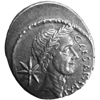 Julius Caesar
Julius Caesar Augustus
Augustus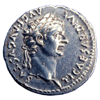 Tiberius
Tiberius Caligula
Caligula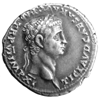 Claudius
Claudius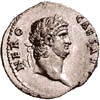 Nero
Nero Galba
Galba Otho
Otho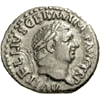 Vitellius
Vitellius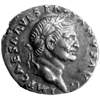 Vespasian
Vespasian Titus
Titus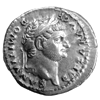 Domitian
Domitian
